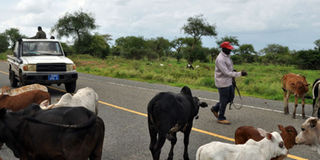Why South Sudan cattle rustlers keep terrorising northern Uganda

South Sudan security officials drive a herd of cows recovered from suspected rustlers at Seritenya border post along Uganda South Sudan border last year. Photo by Tobbias Jolly Owiny.
When Uganda and South Sudan leaders agreed in March to work together to stop cattle rustling, illegal logging and smuggling of goods, it was news good enough to revive hope, especially among the people who live along the borderline between the two countries
At a joint border meeting in Koboko Town in March, Yei River State governor Emmanuel Anthony Adil asked security agencies of the two countries to collaborate in order to guarantee peace and promote pan-Africanism between Uganda and South Sudan.
However, since the March agreement, five separate cattle raids by armed cattle rustlers suspected to be from South Sudan in the districts of Lamwo and Amuru along the border have indicated that terms of the agreement are yet to be implemented.
No solution yet
Information Saturday Monitor has established from a South Sudanese official indicates that looting of properties and rustling of livestock by armed South Sudanese pastoralists may not end any time soon.
Col Charles Rufus, the officer-in-charge of Customs at the Seritenya border, says ending cattle raids by armed South Sudanese pastoralists will only be possible if government and the rebels sign a final peace agreement.
“It will only be possible to remove the guns from the insurgents after a final peace agreement is signed and the people are resettled back in their homes. That is when government will be able to put in place a policy to see that the guns in wrong hands are removed,” Col Rufas says.
Guns in wrong hands
According to him, there are too many guns currently in wrong hands and this has soiled South Sudan’s integrity and friendship with neighbouring states of Uganda, Kenya and DR Congo.
“Most of these natives have guns and right now, you cannot tell a civilian from a soldier or a rebel. It has affected our diplomacy with neighbours because some of them attack passengers or trucks on our roads and loot from, especially Ugandans,” Col Rufas says.
West Nile and Acholi sub-regions, which border the troubled country have in the recent past registered frequent raids by armed men suspected to be from South Sudan, who loot properties, food and livestock from communities inside Uganda.
For example, the border point at Oraba in Koboko District has remained inactive for the last two years due to the rustling and the fact that the area is controlled by the opposition forces loyal to former South Sudan vice president, Dr Riek Machar.
Just like their counterparts in Lamwo District in Acholi sub-region, communities in Moyo District have been victims of the war in South Sudan, where authorities say more than 20,000 heads of cattle have been lost to armed men.
However, in Lamwo, which borders South Sudan to the north, cattle rustling carried out by suspected armed South Sudanese rustlers have forced many farmers to abandon livestock farming.
Statistics Saturday Monitor obtained from Lamwo District indicate that a total of 254 goats and 100 cattle have so far been stolen by suspected South Sudan rustlers since February last year. Livestock farming in the district has been severely hindered by cattle rustling.
However, Col Rufus says South Sudan has failed to manage or control gun crime and cattle raids internally due to the volatile situation existing.
The two countries are yet to resolve the land dispute in the Moyo area of Uganda bordering Kajokeji area of South Sudan with, especially the Gbari area being contested by both the Madi and Kuku ethnic groups.
The areas most affected by cattle raids include Loremebenge, Goloro, Layamo, Central, Logede, Lopulingi and Ywaya villages, all in Agoro Sub-county and Lutuko, Orobo and Popany villages in Madi Opei Sub-county.
Are vigilantes the solution?
Last weekend, during the passing-out ceremony for a total of 1,215 vigilantes at Madiopei Sub-county headquarters, President Museveni, in his message read by the NRM party secretary general, Ms Justine Kasule Lumumba, said communities in Lamwo District should allow their children to be trained to guard the borders against armed cattle rustlers.
In his message, Mr Museveni said when youth in Karamoja were recruited as LDUs to guard against cattle rustlers from Turukana, the vice reduced immediately, an example that people of Lamwo should emulate.
“The way we did it in Karamoja to have their sons and daughters trained as LDUs to be the ones to offer security along their border is the same approach that will solve the problem in Lamwo here,” Mr Museveni said.
He noted that UPDF soldiers on the ground are only carrying out stop-gap measures, which is quite insufficient to handle the rustling problem at hand.
Lamwo County MP and also Disaster Preparedness minister Hillary Onek said: “We believe that by training these young men and women as whistle blowers and to coordinate information with the army, normalcy may return. The electricity and tarmac roads we have should have transformed us economically but raids and lootings by armed South Sudanese pastoralists scare our people from investments.”
Mr James Nabinson Kidega, the Lamwo Resident District Commissioner, said the rustlers attack Ugandan every month.
“If they break through our borders, it means we lack the manpower to handle them, and this can only be saved by training vigilantes and LDUs. We have traced the raiders back to Teritenya, Lubone and Owinykibul [in South Sudan] as their origin,” Mr Kidega said.




